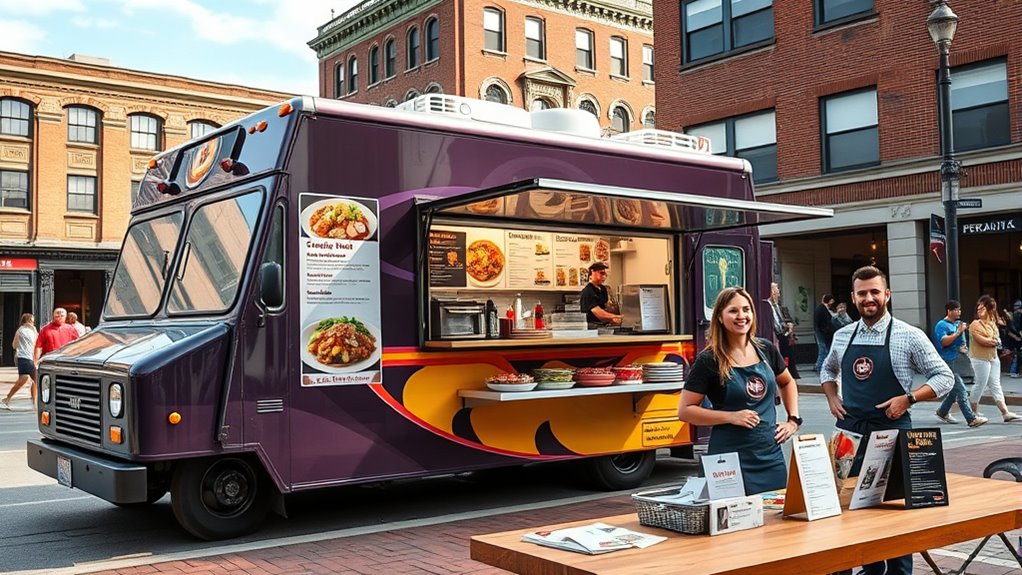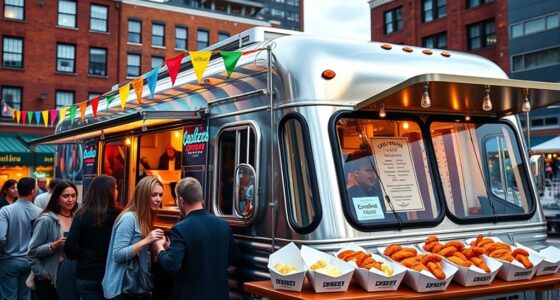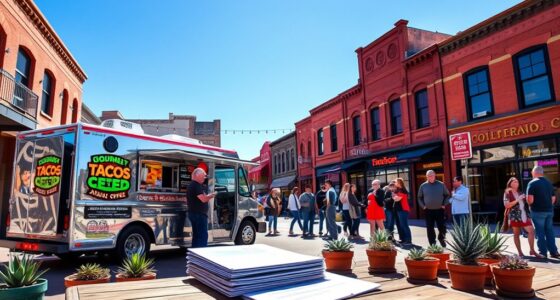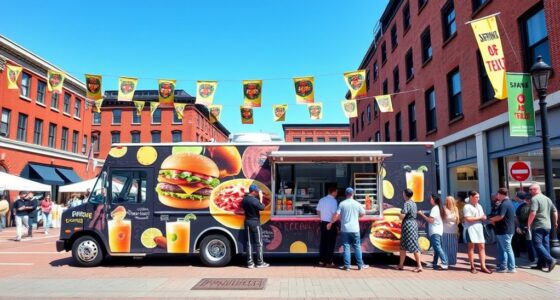To open a food truck in Peoria, Illinois, you need to secure permits like the food service license, fire permit, and possibly event or zoning permits, all while ensuring your truck meets health and safety standards. Budget between $30,000 and $150,000 for startup costs, including equipment and permits. Select high traffic locations, participate in local events, and create a menu that complies with regulations. Effective marketing through social media will boost your success; explore more to start your journey.
Key Takeaways
- Obtain all necessary permits, including health, fire, zoning, and event-specific licenses, and ensure vehicle and menu compliance before launching.
- Budget $30,000–$150,000 for truck, equipment, permits, insurance, and ongoing operational costs like ingredients and fuel.
- Choose high foot traffic locations such as downtown Peoria, parks, or event venues, and secure permits for festivals and community events.
- Develop a compelling menu with health department approval, and leverage social media, local events, and partnerships for marketing and community engagement.
- Conduct regular safety inspections, pass health and fire department inspections, and maintain compliance with local regulations for smooth operations.
Navigating Permits and Licensing Requirements in Peoria
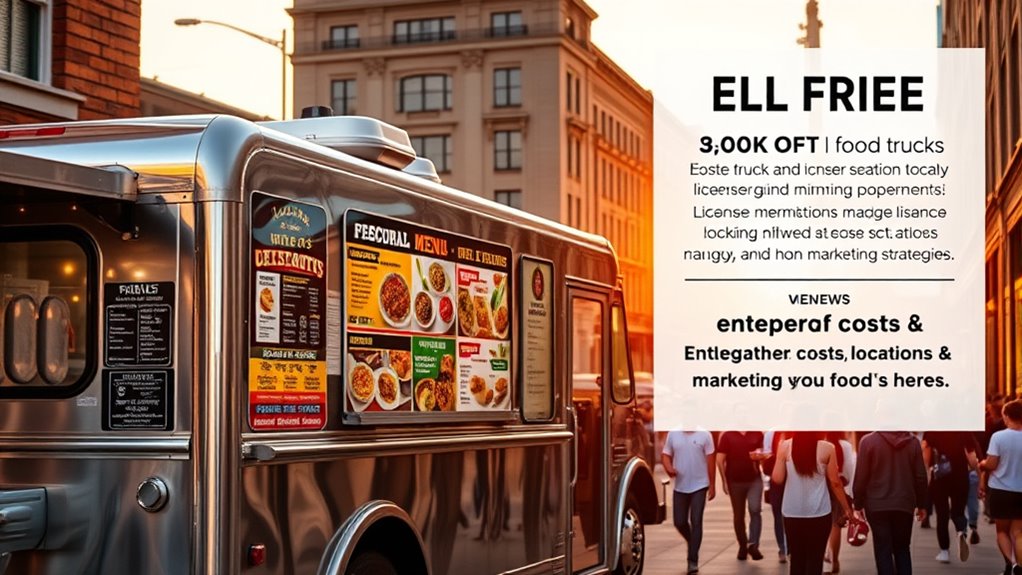
Managing permits and licensing requirements in Peoria is essential for legally operating a food truck. You’ll need to obtain a license under the Illinois Food Code and Peoria County Code Chapter 10 Food Safety. This involves submitting a Plan Review Application, scaled drawings, your menu, and operational plans like pest control protocols. Before opening, you must pay annual license fees and pass a final health department inspection to verify equipment functionality. For mobile food trucks, you’ll need to complete a Mobile Food Vehicle Application, City Tax Application, and submit a sample menu. The Peoria Fire Department will also inspect your truck and issue a Fire Permit. If operating temporarily, you’ll need a Temporary Food License, and for specific zones, you may require additional permits like a Right-Of-Way License. All establishments meeting Illinois Food Code and Peoria County Food Safety definitions must obtain a license, ensuring compliance with local health and safety standards. Additionally, understanding the food safety regulations helps prevent violations and ensures smooth operation.
Understanding the Costs Involved in Launching Your Food Truck
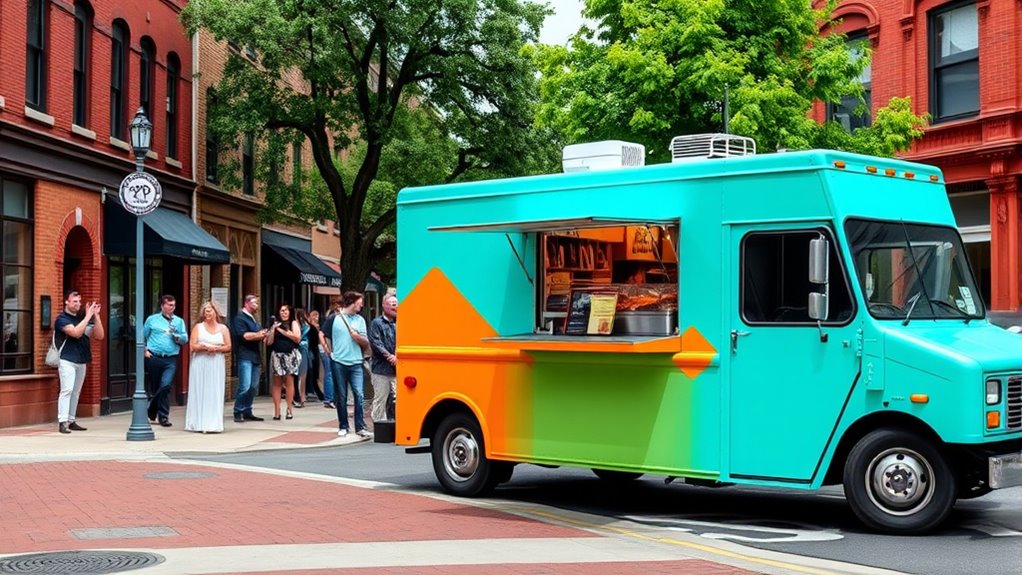
Launching a food truck requires careful financial planning, as the costs can vary widely depending on your choices and location. The initial investment for a truck ranges from $30,000 to $150,000, depending on whether you buy new or used and the equipment included. Retrofitting a used vehicle can help reduce costs while ensuring kitchen functionality. Expect to spend around $2,000–$3,000 on essential kitchen equipment and initial inventory, plus about $300 on serveware. Insurance premiums vary but are a crucial part of your budget. Ongoing costs include ingredients ($1,000+ weekly), fuel ($500–$600 monthly), maintenance ($500–$1,000 monthly), and supplies. Additionally, permit fees, licensing, and compliance costs in Peoria should be factored into your overall financial plan. Understanding local regulations and permit requirements is essential to avoid unexpected expenses and ensure smooth operations as you launch your food truck business. To manage these expenses effectively, creating a detailed budget and accounting for projected operating costs can help you stay on track and make informed decisions.
Choosing Prime Locations for Mobile Food Services
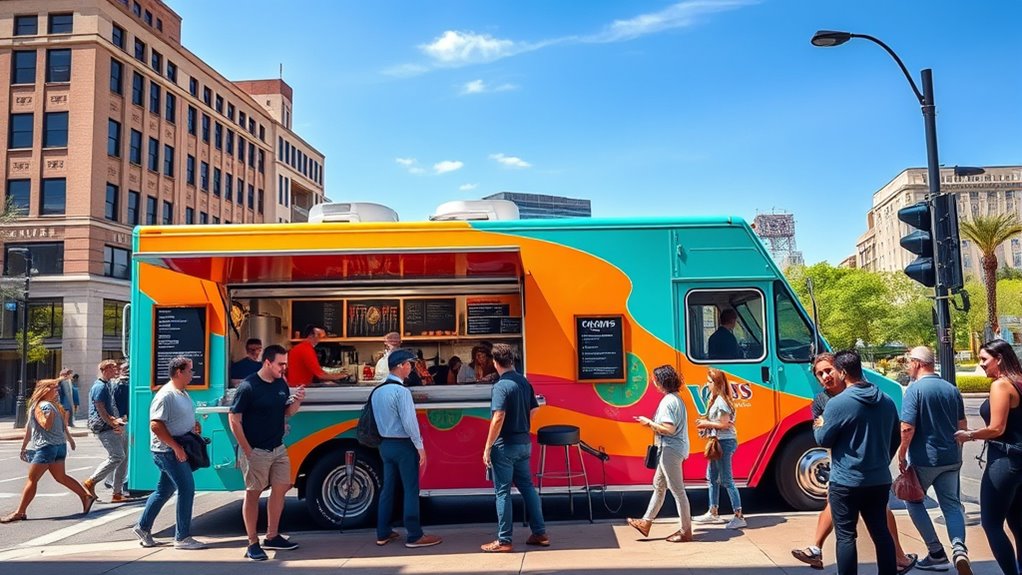
To maximize your food truck’s success, you need to pick prime locations with high foot traffic, like downtown Peoria or popular parks. It’s also essential to secure permits and understand zone regulations to avoid legal issues. Considering nearby event venues and ensuring easy access can help boost your visibility and customer base. Balco Funnel Cakes, for example, often attends festival and neighborhood events to attract more customers. Additionally, understanding ethical hacking principles can help you safeguard your business’s digital presence from cyber threats.
High Foot Traffic Areas
Choosing the right location is essential for food trucks to attract high foot traffic in Peoria. Focus on areas near retail and mixed-use developments where pedestrian shortcuts have naturally formed, despite poor walkability. Well-maintained sidewalks, good street lighting, and pedestrian-friendly infrastructure boost foot traffic and make your truck more visible. Downtown Peoria’s efforts to convert one-way streets into two-way traffic help slow vehicles, increasing pedestrian presence. Streets with on-street parking and narrower lanes encourage slower traffic and more foot traffic. Safer neighborhoods, such as Peoria’s northwest, also see higher pedestrian activity, making them ideal spots. Additionally, areas with connected bike lanes and active streets during peak hours can expand your customer base, increasing your chances of success. Incorporating smart city technologies like real-time foot traffic monitoring can help you identify the most lucrative locations and optimize your placement strategy.
Event and Festival Spots
Participating in popular events and festivals is a strategic way to boost your food truck’s visibility and attract new customers in Peoria. Events like the BCDI Food Truck Frenzy, Peoria Oktoberfest, and Taste of the Heights draw diverse crowds enthusiastic for local cuisine and entertainment. Timing your presence throughout the year—from spring’s Festival of Food Trucks to fall’s Oktoberfest—keeps your brand top of mind. Weekday events offer peak meal-time exposure, while weekend festivals attract larger crowds. Position your truck near main entrances, stages, or clusters of complementary vendors to maximize foot traffic. Many festivals provide amenities like tables or entertainment zones, enhancing customer experience. Make certain your placement facilitates quick restocking and easy waste disposal to keep operations smooth and service efficient. Event participation often requires advance registration or permits, so planning ahead can help secure prime spots and avoid last-minute issues.
Zone and Permit Regulations
Understanding zone and permit regulations is essential for selecting the best locations for your mobile food truck in Peoria. You must operate on private property with the property owner’s written consent and approval from the Zoning Administrator. Confirm your chosen site complies with land use restrictions and zoning classifications. You cannot operate within 100 feet of restricted sites or 500 feet of schools during active hours. Avoid areas near bus stops, taxi stands, handicap zones, intersections, or building entrances, and secure permits for city right-of-ways. Maintain at least 300 feet from other food vendors unless they consent or are operated by the same owner. Also, don’t set up within 500 feet of licensed events without permission. On public sidewalks, keep a four-foot clearance for pedestrians, and never block drive aisles or access routes. Additionally, you should regularly review local zoning laws to stay updated on any changes that could affect your operating permissions.
Crafting a Menu That Meets Regulations and Attracts Customers
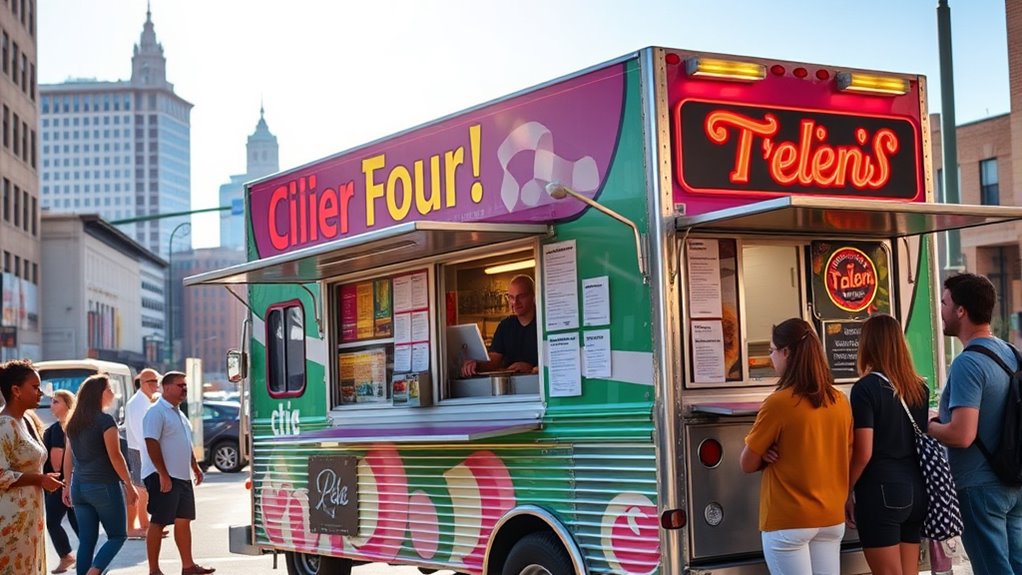
Crafting a menu for your food truck requires balancing regulatory compliance with customer appeal. You need to guarantee your menu aligns with Illinois Food Code and Peoria County Food Safety rules, including allergen disclosures like sesame, peanuts, and gluten. All items must have accurate descriptions and ingredient lists to pass inspections and protect consumers. Your menu should focus on items that are safe and efficient to prepare in a mobile kitchen, favoring simple, portable, and quick-to-serve options. Consider seasonal ingredients and sourcing availability to keep offerings fresh and cost-effective. Incorporate vegetarian or gluten-free choices with proper allergen labeling to attract diverse customers. Additionally, utilizing menu planning tools can streamline compliance and innovation in your offerings. Remember, submitting your menu for review and licensing is essential before operation, so plan accordingly to meet all local regulations. Before launching, ensure your menu items are approved by the local health department to avoid delays in your licensing process.
Effective Marketing Strategies for Food Truck Success
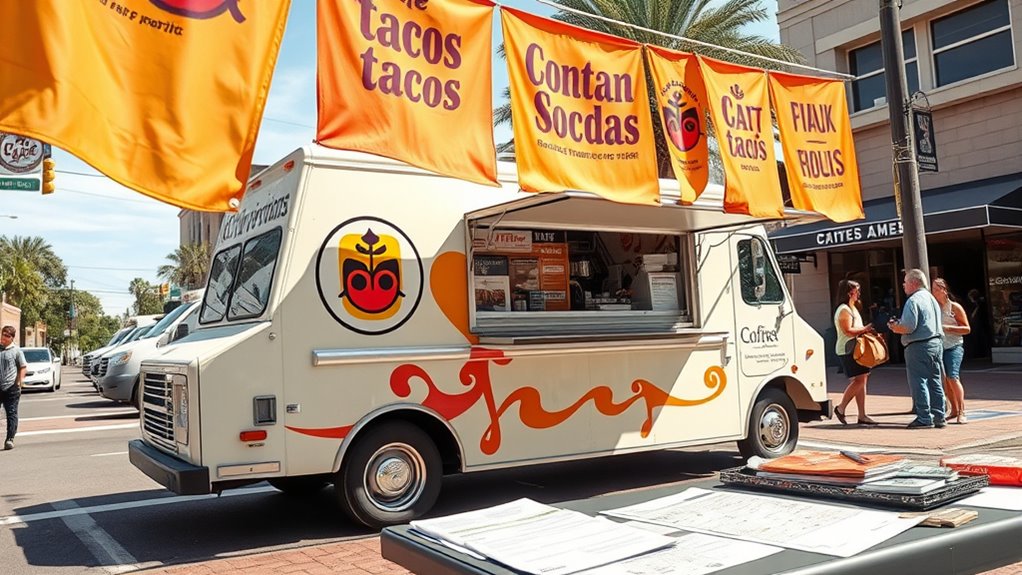
To succeed in Peoria’s food truck scene, you need to leverage social media and community events effectively. Engaging regularly on platforms like Facebook can boost your visibility and sales, while participating in local festivals helps build a loyal customer base. Combining these strategies creates a strong presence that attracts new customers and encourages repeat business. Additionally, implementing loyalty programs and seasonal promotions can lead to a 30% increase in repeat visits, further solidifying your customer relationships.
Social Media Engagement
Effective social media engagement is essential for food trucks aiming to boost visibility and attract more customers. Posting frequent, real-time location updates on platforms like Twitter and Instagram Stories keeps your followers informed about your current and upcoming stops. Geotagging your posts enhances local discoverability, encouraging nearby users to visit spontaneously. Combining these updates with push notifications through apps or SMS creates immediate alerts, fostering trust and repeat visits. High-quality images and short videos of your dishes, especially trending formats like Reels and TikTok Shorts, boost engagement and attract new customers. Partnering with local influencers and encouraging customers to share experiences with branded hashtags generate authentic UGC, expanding your reach. Using targeted ads and geotargeting further increases awareness and drives foot traffic to your truck. Consistent updates also help maintain steady foot traffic by keeping your audience engaged with your location schedule. Additionally, leveraging privacy policies ensures your marketing efforts comply with user consent preferences and build trust with your audience.
Community Event Participation
Participating in community events is a powerful way to boost your food truck’s visibility and build strong local relationships. These gatherings, like farmers’ markets and festivals, let you showcase your offerings directly to the community. To maximize benefits, consider these strategies:
- Attend recurring events, such as “Taco Tuesdays,” to develop loyal customers.
- Collaborate with event organizers for prime placement and higher foot traffic.
- Partner with local charities or community festivals to enhance brand goodwill.
- Test new menu items and gather immediate feedback from diverse attendees.
Ensuring Compliance and Preparing for Inspection Processes
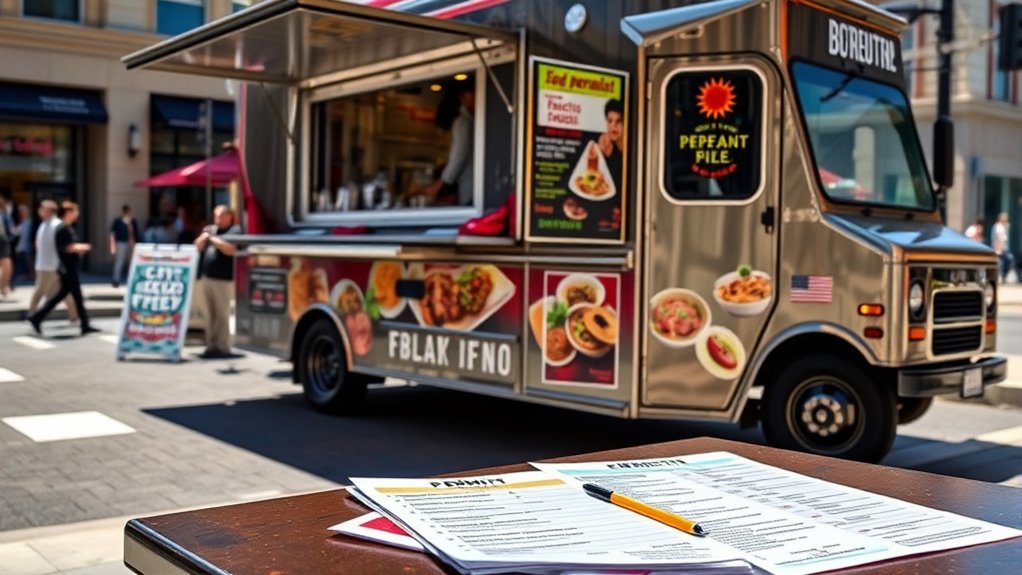
Ensuring compliance and preparing for inspection processes is crucial for a food truck operating in Peoria. First, obtain all necessary health department licenses and permits from the Peoria City/County Health Department before opening. Schedule and pass the Fire Permit inspection with the Peoria Fire Department, and pay annual licensing fees on time. Make sure your vehicle displays your business owner’s name as required. Adhere to Illinois Food Code and local food safety regulations, conducting regular self-inspections to catch issues early. Prepare for the final inspection after completing your build-out by using a self-checklist. Coordinate with health and fire departments early to schedule inspections, and train your staff thoroughly on hygiene, allergen management, and food safety standards. Keep detailed records to demonstrate ongoing compliance. Monitoring signs of spoilage in ingredients can help prevent health violations and ensure food safety during operations.
Frequently Asked Questions
How Long Does the Permit Approval Process Typically Take in Peoria?
You’re likely wondering how long the permit approval takes in Peoria. Typically, once you submit all required documents, your commercial food truck permit review takes about 14 business days. Keep in mind, delays can occur if your paperwork isn’t complete or needs corrections. After approval, you’ll schedule a final inspection, which requires at least one week’s notice. Planning ahead guarantees a smoother process for your food truck permit.
Are There Specific Health Regulations for Serving Alcohol From a Food Truck?
You need to follow specific health regulations when serving alcohol from your food truck. Make certain your truck operates out of a licensed commissary with proper facilities. Keep sanitary conditions, get health department inspections, and meet licensing requirements. Alcohol service must happen alongside food sales, with limits on revenue and locations. Staff should be trained, and all permits displayed. These steps help you stay compliant and provide safe, responsible alcohol service.
Can I Operate My Food Truck Outside of Peoria County During Events?
Think of operating your food truck outside Peoria as steering different waters—each with its own currents. Yes, you can, but you need the right permits for each location. Some counties require temporary licenses for events, and inspections ensure safety standards. Coordinate with local health departments and secure approvals beforehand. Like charting a course, understanding these rules helps you smoothly sail through out-of-county operations.
What Are the Insurance Requirements for Food Truck Owners in Peoria?
You need to meet Illinois’ insurance requirements for your food truck. This includes carrying commercial auto insurance with minimum liability limits of $25,000 per person and $50,000 per accident, covering accidents, property damage, and liability. You may also need general liability and property insurance depending on your operations. Always keep Certificates of Insurance ready, review policies annually, and make certain your coverage aligns with state laws to stay compliant and protected.
Are There Restrictions on Serving Certain Types of Food in Mobile Units?
Think of your mobile food venture as a chef maneuvering a busy kitchen—there are rules for what you can serve. In Peoria, you’re limited by health and safety rules that restrict serving high-risk or hazardous foods without proper permits. Certain foods may need special handling or equipment. Always check local regulations to make sure your menu complies, avoiding penalties or permit issues while keeping your customers safe and satisfied.
Conclusion
Starting your food truck in Peoria is like steering a ship through calm waters—clear permits, smart costs, and prime spots guide you. Craft a menu that delights while meeting regulations, then cast your marketing net wide. Stay compliant and prepared, just like a seasoned captain ready for inspection storms. With focus and passion, you’ll navigate these steps smoothly, turning your food truck dream into a vibrant reality on Peoria’s bustling streets.
